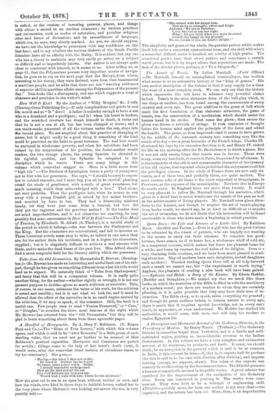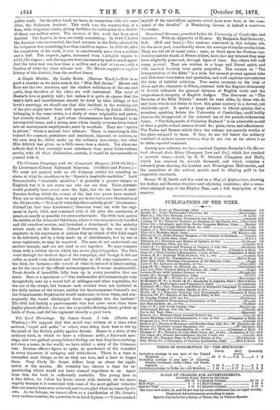A Descriptive and Historical Account of the Godavery District, in
the Presidency of Madras. By Henry Morris. (Trilliner.)—The Godavery District is somewhat larger than Yorkshire, and is a fertile and well- cultivated region, yielding no inconsiderable revenue to the Indian Government. In this volnmo we have a very complete and exhaustive account of its resources, its products, and trade. It must, we should think, be an exception to the poverty which is said to bo so common in India, if this account be truo,—if, that is, it exports half its produce (for this is said to ho the case with division after division), and imports nothing (except, wo suppose, silver). The value of tho exports can scarcely be swallowed up by the Government taxes. The District presents a feature of remarkable interest in its public works. A great scheme was contrived for the improvement of the navigation of the Godavery river. Every one concurred in praising it. The works were com- menced. They were held to be a triumph of engineering skill. £700,000—possibly more, for here our author is not very clear—was expended, and the return has been nil. Here, then, is en unproductive public work. On the other hand, we have, in connection with the same river, the Godavery Ancient. This -work was the construction of a dam, with irrigation canals, giving facilities for cultivation to a distric' of about one million acres. The success of this work has been most decided. The figures, in fact, are really astonishing. In 1846-7, before the Annicut was constructed, the land revenue in the Delta affected by the irrigation was something less than a million rupees. In 1859-60, after the completion of the work, it rose to considerably more than a million and a half. The exports, again, increased from 1,356,336 rupees to 4,214,745 rupees ; and the imports wore increased by half as much again. And the total cost was less than a million and a half of rupees, only a fraction of what the river scheme cost. Mr. Morris supplies a copious history of the district, from the earliest times.



































 Previous page
Previous page